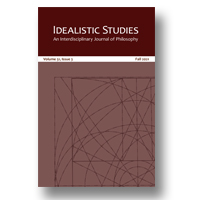|
articles |
|
1.
|
Idealistic Studies:
Volume >
48 >
Issue: 3
Christopher Buckman
Political Ramifications of Formal Ugliness in Kant’s Aesthetics
abstract |
view |
rights & permissions
| cited by
Kant’s theory of taste supports his political theory by providing the judgment of beauty as a symbol of the good and example of teleological experience, allowing us to imagine the otherwise obscure movement of nature and history toward the ideal human community. If interpreters are correct in believing that Kant should make room for pure judgments of ugliness in his theory of taste, we will have to consider the implications of such judgments for Kant’s political theory. It is here proposed that pure, formal ugliness symbolizes regressive, counter-teleological trends in nature and history. Kant’s paradoxical stance on the right to rebellion, both condemning and supporting the French Revolution, is interpreted as failing to take into account negative social forces signified by ugliness, and therefore neglecting the role of moral agency in social change.
|
|
|
|
|
2.
|
Idealistic Studies:
Volume >
48 >
Issue: 3
Andrew Jussaume
Schelling’s Metaphysics of Love
abstract |
view |
rights & permissions
| cited by
This paper argues that Schelling’s understanding of love more readily captures his notion of unground as a contradictory-producing a priori. Love is a more appropriate term for unground insofar as it conveys the juxtaposition of feelings which motivate the eternal beginning. Self-expression, for Schelling, is born from the tension between God’s longing to be and his freedom. While this antithesis entails that God’s decision to be is only subjectively intelligible, it also implies the element of risk in the decision insofar as it suggests the groundlessness—and, thus, ambiguity—of God’s wanting to be. Indeed, for Schelling, God must decide whether to relinquish his perfection for the sake of an uncertain future. This essay offers a fresh interpretation God’s decision insofar as it introduces love as a means of understanding the attractiveness of God’s risk-taking, while also affirming his freedom to decide if the risk is worthwhile.
|
|
|
|
|
3.
|
Idealistic Studies:
Volume >
48 >
Issue: 3
Toby J. Svoboda
A Place for Kant's Schematism in Glauben und Wissen
abstract |
view |
rights & permissions
| cited by
In Glauben und Wissen, Hegel criticizes Kant for drawing a deep division between sensibility and understanding. Hegel suggests that Kant’s faculty of productive imagination is a step toward uniting intuition and concept in an original unity out of which the two arise, but this requires him to treat the productive imagination in ways Kant would not approve. I argue that Kant’s doctrine of the schematism offers an advance on the productive imagination when it comes to solving the intuition/concept dualism Hegel critiques, although there remain serious problems with which Hegel would take issue. Although the schematism might answer some of the criticisms Hegel aims at the intuition/concept dualism, it does not solve the related problem Hegel finds in Kant, namely the dualism of cognition and thing-in-itself.
|
|
|
|
|
4.
|
Idealistic Studies:
Volume >
48 >
Issue: 3
Fiorella Tomassini
Kant’s Reformulation of the Concept of Ius Naturae
abstract |
view |
rights & permissions
| cited by
Like previous theorists of natural law, Kant believes in the possibility (and necessity) of a rational theory of ius, but also claims that the very concept of ius naturae and the method of investigation of its principles must be thoroughly reformulated. I will maintain that Kant solves the methodological problem of natural law theories by stating that a rational doctrine of Right concerns pure rational knowledge. Right must be conceived as a metaphysical doctrine in which its principles and laws are determined a priori. By conceiving the idea of a “metaphysics of morals” and linking Right with it, he finds a way both to conserve the notion of ius naturae (i.e., rational and “immutable principles for any giving of positive law” (RL, AA 06: 229)) and to purify it from any empirical or anthropological element.
|
|
|
|
|
book review |
|
5.
|
Idealistic Studies:
Volume >
48 >
Issue: 3
Martin Krahn
Wes Furlotte, The Problem of Nature in Hegel’s Final System
view |
rights & permissions
| cited by
|
|
|
|
